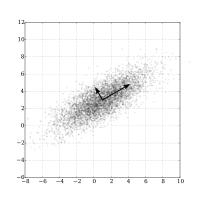
Photo from wikipedia
Purpose A systematic review and meta-analysis was conducted comparing the presence of anti-phospholipid (anti-PL) antibodies between women of reproductive age, without diagnosis of antiphospholipid syndrome, who experienced at least two… Click to show full abstract
Purpose A systematic review and meta-analysis was conducted comparing the presence of anti-phospholipid (anti-PL) antibodies between women of reproductive age, without diagnosis of antiphospholipid syndrome, who experienced at least two implantation failures following in vitro fertilization and embryo transfer (IVF-ET), and either women who had a successful implantation after IVF-ET or women with at least one successful spontaneous pregnancy or unselected healthy fertile women with no history of IVF-ET. Methods Systematic search of the literature and meta-analysis of the relevant studies studying presence of antiphospholipid antibodies in women experiencing at least two implantation failures in IVF-ET as compared to either women who had a successful implantation after IVF-ET or/and women with at least one successful spontaneous pregnancy or unselected healthy fertile women with no history of IVF-ET. Six hundred ninety-four published reports were retrieved; 17 of them fulfilled the inclusion criteria set. Results Presence of either any type of anti-phospholipid or anticardiolipin antibodies or lupus-anticoagulant in women experiencing at least two implantation failures in IVF-ET was associated with increased implantation failure compared to women who had a successful implantation after IVF-ET (relative risk, RR: 3.06, 5.06 and 5.81, respectively). Presence of either anticardiolipin or lupus-anticoagulant or anti-beta2 glycoprotein-I or anti-phosphatidylserine antibodies in women experiencing at least two implantation failures in IVF-EΤ was associated with increased implantation failure compared to unselected healthy fertile women with no history of IVF-ET (RR:13.92, 6.37, 15.04 and 164.58, respectively). Conclusion The prevalence of antiphospholipid antibodies, particularly that of anti-beta2 glycoprotein-I and anti-phosphatidylserine antibodies, in women experiencing at least two implantation failures in IVF-ET without diagnosis of antiphospholipid syndrome is significantly greater than either in women who had a successful implantation after IVF-ET or women with at least one successful spontaneous pregnancy or unselected healthy fertile women with no history of IVF-ET. Trial registration number PROSPERO ID: CRD42018081458
Journal Title: PLoS ONE
Year Published: 2022
Link to full text (if available)
Share on Social Media: Sign Up to like & get
recommendations!